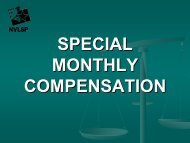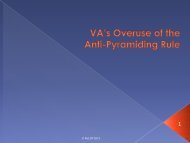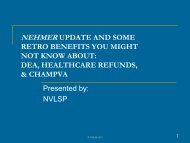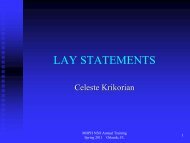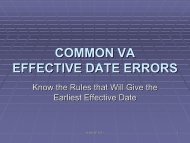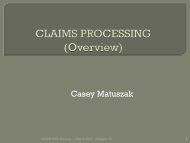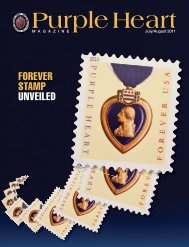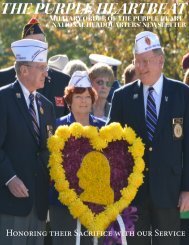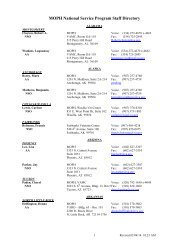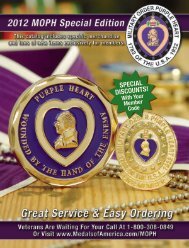Finch v. Hughes Aircraft Co. - Military Order of the Purple Heart
Finch v. Hughes Aircraft Co. - Military Order of the Purple Heart
Finch v. Hughes Aircraft Co. - Military Order of the Purple Heart
- No tags were found...
You also want an ePaper? Increase the reach of your titles
YUMPU automatically turns print PDFs into web optimized ePapers that Google loves.
Wednesday Evening<br />
Optional Session<br />
1
Overview<br />
‣ How <strong>Co</strong>urts See <strong>the</strong> Role <strong>of</strong> VSOs<br />
(<strong>Co</strong>mer v. Peake)<br />
‣ How to Get a Medical Opinion (DIC Case-<br />
Residuals <strong>of</strong> Frostbite)<br />
‣ Secondary SC for Back Due to SC Ankle<br />
2
Introduction<br />
‣ Leroy <strong>Co</strong>mer appealed CAVC decision<br />
holding that he had not properly raised <strong>the</strong><br />
issue <strong>of</strong> entitlement to an EED for TDIU<br />
3
II. Facts<br />
‣ Active Duty: 1967- 1970<br />
‣ Vietnam: 1968- 1960 guarding ammunition<br />
depot under mortar attack every night<br />
4
II. Facts (cont.)<br />
‣ 1988- <strong>Co</strong>mer filed a claim pro se for SC<br />
for PTSD<br />
‣ Rated 30% but not SC, <strong>the</strong>refore, received<br />
no benefits<br />
‣ Failed to establish relationship between<br />
PTSD and service<br />
5
II. Facts (cont.)<br />
‣ In 1999 Vet filed request to reopen –<br />
denied<br />
‣ Vet appealed to BVA – denial reversed<br />
and remanded to RO<br />
• “generally appears that <strong>the</strong> diagnosis <strong>of</strong> PTSD<br />
is related to service”<br />
6
II. Facts (cont.)<br />
‣ RO granted 30% SC effective 02/26/99<br />
‣ Vet filed NoD in 2003 requesting higher<br />
rating and 1988 ED<br />
‣ RO responded by increasing to 50%<br />
‣ Vet appealed in 2003 (DAV statement)<br />
7
II. Facts (cont.)<br />
‣ C&P exam in 2004- PTSD diagnosed<br />
‣ RO <strong>the</strong>n gave 70% and TDIU effective<br />
05/05/04<br />
‣ Board denied ED <strong>of</strong> 02/26/99 & retroactive<br />
benefits – No CUE<br />
8
III. CAVC<br />
‣ Vet gained legal representation and<br />
appealed to CAVC<br />
‣ CAVC denied jurisdiction b/c he did not<br />
raise retroactive benefits in NoD<br />
‣ Also said VA complied with notice<br />
requirements <strong>of</strong> 38 U.S.C. § 5103(a)<br />
‣ Case appealed to Federal Circuit<br />
9
IV. Federal Circuit Decision<br />
(<strong>Co</strong>mer’s arguments)<br />
‣ Board misconstrued Roberson by denying<br />
jurisdiction over retroactive benefits<br />
‣ Board should consider TDIU whenever pro<br />
se vet seeks higher disability rating w/<br />
evidence <strong>of</strong> unemployability<br />
10
Roberson<br />
‣ Vet with significant disabilities filed pro se<br />
but did not specify TDIU, and RO did not<br />
give TDIU<br />
‣ Sought to reopen asserting RO contained<br />
CUE and failed to consider TDUI<br />
‣ Vet <strong>Co</strong>urt rejected but appeal reversed<br />
11
Roberson Appeal<br />
‣ Although no TDIU specifically requested,<br />
VA required to consider b/c record<br />
contained evidence <strong>of</strong> unemployability<br />
‣ Like Roberson, <strong>Co</strong>mer also pro se and<br />
presented evidence <strong>of</strong> unemployability<br />
12
A. Sympa<strong>the</strong>tic Reading <strong>of</strong> Vet’s<br />
Filings<br />
‣ BUT Gov. says Roberson inapplicable<br />
here b/c it does not apply:<br />
• To appeal submissions to <strong>the</strong> board following<br />
an initial rating determination<br />
• To situations in which a veteran is assisted by<br />
a rep from a VSO<br />
13
Gov Reads Roberson too<br />
Restrictively<br />
• Requires symp. reading to all pro se<br />
pleadings<br />
• No reason Roberson shouldn’t apply to NoD’s<br />
• Paternalistic nature <strong>of</strong> proceedings require<br />
board fully & sympa<strong>the</strong>tically develop vets<br />
claims on all merits<br />
14
A. Sympa<strong>the</strong>tic Reading <strong>of</strong> Vet’s<br />
Filings<br />
‣ Vet didn’t state certain entitlement to EED<br />
‣ BUT claim for increased rating w/ o<strong>the</strong>r<br />
EED claim & pervasive evidence sufficient<br />
to raise <strong>the</strong> EED claim<br />
15
VA has duty to read appeal<br />
sympa<strong>the</strong>tically<br />
‣ Duty to read <strong>the</strong> claim sympa<strong>the</strong>tically &<br />
ascertain all potential claims is antecedent<br />
to duty to ensure issue properly raised<br />
‣ 38 C.F.R. § 20.202 – construe vet’s<br />
arguments on appeal in liberal manner<br />
‣ Vet may lack knowledge <strong>of</strong> all VA terms<br />
16
<strong>Hughes</strong> v. Rowe<br />
‣ Pleadings by pro se litigants should be<br />
held to lesser standards than those by<br />
lawyers since:<br />
• “[a]n unrepresented litigant should not be<br />
punished for his failure to recognize subtle<br />
factual or legal deficiencies in his claims”<br />
17
Barrett v. Nicholson (2006)<br />
‣ “The government’s interest in veterans<br />
cases is not that it shall win, but ra<strong>the</strong>r that<br />
justice shall be done, that all veterans so<br />
entitled received <strong>the</strong> benefits due to <strong>the</strong>m.”<br />
18
VA <strong>Co</strong>mpensation System Not<br />
Meant as Trap<br />
‣ VA has affirmative duty to assist vets by<br />
informing <strong>the</strong>m <strong>of</strong> benefits available and<br />
assisting in claims – Jaquay<br />
‣ Assistance particularly necessary where<br />
as here, vet has psychological affliction<br />
19
VA’s Sympa<strong>the</strong>tic Duty<br />
‣ VSO representative’s are not <strong>the</strong><br />
equivalent <strong>of</strong> legal representation<br />
‣ It was not until after <strong>Co</strong>mer appealed that<br />
he used VSO assistance<br />
‣ 36 U.S.C. § 50302: function <strong>of</strong> DAV is to<br />
cooperate with VA to get benefits, <strong>the</strong>ir<br />
role is completely different from an atty<br />
20
VA’s Sympa<strong>the</strong>tic Duty Applies w/<br />
VSO<br />
‣ RO originally thought claim was not SC,<br />
but when reopened, noted – “it generally<br />
appears that <strong>the</strong> diagnosis <strong>of</strong> PTSD<br />
related to service”<br />
‣ To hold vet forfeits rights when using VSO<br />
would be to discourage vets from seeking<br />
assistance<br />
21
B. Does VA have an Obligation to<br />
Inform Vets<br />
‣ <strong>Co</strong>mer’s 2 nd argument that VA had duty<br />
under 38 U.S.C. § 5103(a), to inform him<br />
<strong>of</strong> <strong>the</strong> need to file CUE claim to get<br />
retroactive benefits<br />
‣ He cited to 38 U.S.C. § 5103(a) for<br />
support<br />
22
Reopening process is very<br />
difficult<br />
‣ Particularly so when pro se<br />
‣ Vet likely to assume he will get benefits<br />
from earlier claim if he prevails<br />
‣ Yet, <strong>the</strong> earliest ED is <strong>the</strong> time <strong>of</strong><br />
reopening<br />
‣ To get earlier ED CUE is needed<br />
23
VA Failure Under 5103(a) Not<br />
Reversible Error<br />
‣ <strong>Co</strong>mer has not forfeited right to bring CUE<br />
‣ Assuming arguendo that VA had duty to<br />
inform about CUE, VA had no opportunity<br />
to make factual determinations whe<strong>the</strong>r he<br />
received notice or had actual knowledge<br />
‣ Issue is moot if <strong>Co</strong>mer filed CUE<br />
24
Outcome Determinative Claims that<br />
are Plead with Specificity<br />
‣ <strong>Co</strong>mer did make specific allegations:<br />
• VA’s determination he was only ‘part packer’<br />
‘grossly erroneous’<br />
• Nightmares as a result <strong>of</strong> combat unit<br />
• Argued RO’s PTSD finding contained ‘clear<br />
error’<br />
• Argued he was ‘combat veteran’<br />
25
CUE Claim Remanded<br />
‣ This factual determination is outside<br />
appellate authority<br />
‣ <strong>Co</strong>mer still has right to file new CUE<br />
motion<br />
‣ Earlier CUE challenge would entitle to<br />
expedited consideration <strong>of</strong> claim<br />
26
“Well,<br />
Here’s Ano<strong>the</strong>r NiceN<br />
Mess<br />
You’ve Gotten Me Into”<br />
Frivolous Claims<br />
27
Introduction<br />
‣ Laurel and Hardy--<br />
movies involved Laurel<br />
convincing Hardy to go along with a get-<br />
rich-quick scheme.<br />
‣ schemes never successful and Laurel<br />
would not accept blame. As <strong>the</strong>y were<br />
being sent to jail (or worse) Laurel would<br />
say<br />
• “Well, here’s s ano<strong>the</strong>r fine mess you have<br />
gotten us into, Ollie.”<br />
28
Introduction<br />
‣ Regs governing behavior and<br />
accreditation <strong>of</strong> agents, attorneys, and<br />
service representatives (or service<br />
<strong>of</strong>ficers)--<br />
--quite possible VA has created<br />
ano<strong>the</strong>r “nice mess”<br />
‣ Regs effective 6/23/08--<br />
--amend 38 C.F.R.<br />
Parts 1, 14, 19 and 20.<br />
29
The New regs<br />
‣ In General <strong>the</strong> New Regs:<br />
• govern behavior and accreditation <strong>of</strong> lay<br />
advocates and attorneys.<br />
• govern fees attorneys and agents may charge<br />
• purpose <strong>of</strong> regs--<br />
fulfill <strong>Co</strong>ngress’ direction<br />
that attorneys/agents may be paid for work<br />
after NOD is filed & ensure responsible<br />
qualified representation.<br />
30
The New Regs<br />
‣ 38 C.F.R. § 14.632 (b)(1) –defines<br />
“competent representation”<br />
• knowledge, skill, thoroughness and<br />
preparation necessary for representation<br />
• Includes:<br />
• Understanding relevant issues <strong>of</strong> fact,<br />
• Understanding relevant issues <strong>of</strong> law,<br />
• Understanding title 38 USC<br />
• Understanding 38 C.F.R.<br />
31
The New regs<br />
‣ 38 C.F.R. § 14.633(c) (4)—knowingly<br />
submitting frivolous claim, issue, or argument<br />
is grounds for suspension from practice before<br />
VA<br />
• first time advocates have to deal with this type <strong>of</strong><br />
rule<br />
32
Frivolous Claims: VA <strong>Co</strong>mments<br />
‣ Frivolous defined<br />
• claim, issue, or argument is F if <strong>the</strong> rep<br />
unable to make a good faith argument on<br />
• The merits <strong>of</strong> <strong>the</strong> position taken; or<br />
• Support <strong>the</strong> position w/ a good faith<br />
argument for extension, modification, or<br />
reversal <strong>of</strong> existing law<br />
33
Frivolous Claims: Objection #1<br />
‣ b/c vets entitled to representation,<br />
VSO policy is to present all claims<br />
for processing, even if no evid<br />
supports grant<br />
• VA response – <strong>the</strong>re is no right to rep for a<br />
frivolous claims<br />
• Senate <strong>Co</strong>mmittee on Vet Affairs recognized<br />
<strong>the</strong> adverse impact <strong>of</strong> frivolous claims filed<br />
by VSOs—could delay valid claims<br />
34
Frivolous Claims: Objection #1<br />
Even if State/Local law requires<br />
•<br />
org to provide rep<br />
VA doesn’t t agree change is<br />
•<br />
necessary<br />
Federal law usually preempts<br />
•<br />
State law by virtue <strong>of</strong> <strong>the</strong><br />
preemption doctrine. See U.S.<br />
<strong>Co</strong>nst. art. VI, cl. 2.<br />
35
Frivolous Claims: Objection #2<br />
‣ Rep held responsible for claims/arguments<br />
submitted by claimants directly to VA<br />
36
Frivolous Claims: Objection #3<br />
‣ definition <strong>of</strong> “frivolous” doesn’t t define “good<br />
faith argument”<br />
‣ VA says definition based on Model Rule 3.1—<br />
is sufficiently clear to provide notice <strong>of</strong><br />
prohibited conduct<br />
‣ were VA to discipline rep for filing F claim,<br />
could appeal to Board, & CAVC cases would<br />
apply & Federal Circuit cases would control<br />
37
Frivolous Claims: Objection #3<br />
‣ Definition <strong>of</strong> “frivolous, frivolous,” cont’d<br />
• Abbs v. Principi, , 237 F.3d 1342, 1345 (Fed. Cir.<br />
2001), defined as arguments “that are beyond <strong>the</strong><br />
reasonable contemplation <strong>of</strong> fair-minded people.”<br />
• Abbs--<br />
--action is frivolous when rep “has significantly<br />
misrepresented <strong>the</strong> law or facts, or has abused <strong>the</strong><br />
judicial process by repeatedly litigating <strong>the</strong> same<br />
issue in <strong>the</strong> same court.” Abbs, , 237 F.3d at 1345.<br />
38
Frivolous Claims: Objection #3<br />
‣ Definition <strong>of</strong> “frivolous, frivolous,” cont’d<br />
‣ <strong>Co</strong>mment 2 to Model Rule 3.1 filing claim<br />
when all facts not known or evidence not fully<br />
developed frivolous<br />
• filing not “F” merely b/c facts not fully substantiated<br />
or b/c lawyer expects to develop vital evidence<br />
• Lawyers--<br />
--inform <strong>the</strong>mselves about facts and law<br />
and determine good faith argument possible<br />
• Action not frivolous even though lawyer believes<br />
client ultimately will not win<br />
• Action frivolous if lawyer unable ei<strong>the</strong>r to make a<br />
good faith argument on <strong>the</strong> merits <strong>of</strong> <strong>the</strong> action or<br />
support action taken by a good faith argument for<br />
an extension, modification or reversal <strong>of</strong> existing<br />
law.<br />
39
Frivolous Claims<br />
‣ The VA stated<br />
• “Like agents and attorneys, VSO representatives<br />
must inform <strong>the</strong>mselves about <strong>the</strong> facts <strong>of</strong> each<br />
case and <strong>the</strong> applicable law, and before providing<br />
fur<strong>the</strong>r representation, determine whe<strong>the</strong>r <strong>the</strong>y can<br />
make a good faith argument in support <strong>of</strong> a claim.”<br />
40
Frivolous Claims<br />
‣ VA interprets ``good faith'' as ``honesty <strong>of</strong><br />
purpose'' and ``freedom <strong>of</strong> intention to<br />
defraud.'' Black's Law Dictionary 477 (6th ed.<br />
1991).<br />
‣ If good faith argument can’t t be made, withdraw<br />
from rep or assume <strong>the</strong> risk <strong>of</strong> VA suspension<br />
‣ Can claim/argument shift from non-frivolous to<br />
frivolous<br />
‣ tension between need to file claim to gain<br />
earliest possible effective date and need to<br />
determine whe<strong>the</strong>r claim, issue, or argument<br />
frivolous.<br />
41
<strong>Co</strong>mpetence<br />
‣ Obviously, to understand <strong>the</strong> relevant issues <strong>of</strong><br />
fact, law, and <strong>the</strong> statutes and regs that impact<br />
<strong>the</strong>se issues an advocate must not only<br />
understand, in general <strong>the</strong> statutes and regs<br />
that govern VA benefits, but have <strong>the</strong> time to<br />
carefully review <strong>the</strong> claims file.<br />
42
<strong>Co</strong>mpetence<br />
‣ Reg seems to require VSOs take reasonable<br />
precautions so service <strong>of</strong>ficers won’t t have to<br />
deal w/ more claims than can be properly<br />
handled<br />
• county, state and national service organizations<br />
may have to reject some claims, not b/c frivolous,<br />
but b/c VSO does not have <strong>the</strong> advocates available<br />
to provide proper rep<br />
• Some VSOs will have to choose between hiring<br />
more service <strong>of</strong>ficers or limiting # <strong>of</strong> claims assigned<br />
to representative<br />
43
Examples <strong>of</strong> Frivolous Claims –<br />
Argument Determinations<br />
‣ Appeal that is frivolous as filed is<br />
frivolous as argued, since any arguments<br />
made in support <strong>of</strong> it are, by definition,<br />
frivolous." <strong>Co</strong>nstant v. United<br />
States, 929 F.2d 654, 658 (Fed. Cir.<br />
1991).<br />
‣ Fact that appeal is w/o merit doesn’t<br />
mean appeal is necessarily frivolous<br />
See Romala <strong>Co</strong>rp. v. United States, 927<br />
F.2d 1219, 1224 (Fed. Cir. 1991)<br />
44
Examples <strong>of</strong> Frivolous Claims –<br />
Argument Determinations<br />
‣ Examples <strong>of</strong> actions deemed sanctionable include<br />
• relitigating issues already finally adjudicated<br />
• failing to explain how <strong>the</strong> trial court erred or to<br />
present cogent or clear arguments for<br />
reversal<br />
45
Examples <strong>of</strong> Frivolous Claims –<br />
Argument Determinations<br />
‣ More examples <strong>of</strong> actions deemed<br />
sanctionable include<br />
• failing to cite authority & ignoring opponent's<br />
contrary cited authority, citing irrelevant or<br />
inapplicable authority<br />
• distorting cited authority<br />
46
Examples <strong>of</strong> Frivolous Claims –<br />
Argument Determinations<br />
‣ More examples <strong>of</strong> actions deemed<br />
sanctionable include<br />
• making irrelevant and illogical arguments<br />
• misrepresenting facts or law to court<br />
• failing to reference or discuss controlling<br />
precedents<br />
• Raising appeal when issue is moot<br />
47
Issues Facing Service Officers<br />
‣ 3 main types <strong>of</strong> service <strong>of</strong>ficers (VSOs(<br />
VSOs):<br />
• VSOs located outside <strong>of</strong> <strong>the</strong> regional <strong>of</strong>fices (ROs(<br />
ROs)<br />
• VSOs located in <strong>the</strong> ROs<br />
• VSO located at <strong>the</strong> AMC or BVA<br />
48
Advocates Located Outside <strong>of</strong> RO<br />
‣ Review <strong>of</strong> <strong>the</strong> Claims File<br />
• Can claim be filed w/o review <strong>of</strong> C File<br />
• Can you decide if most claims not frivolous if you<br />
don’t t review record<br />
• What about protecting earliest possible effective<br />
date<br />
49
Advocates Located Outside <strong>of</strong> RO<br />
‣ Obligation to take all claims<br />
• Can VSO reject claim<br />
• at <strong>the</strong> beginning<br />
• later in <strong>the</strong> process<br />
• is <strong>the</strong> advocate outside <strong>the</strong> RO obligated to<br />
discuss this with <strong>the</strong> DSO<br />
• If so how should this (rejection) be done<br />
50
Advocates Located Outside <strong>of</strong> RO<br />
‣ Claimants filing claims and communicating<br />
with VA without <strong>the</strong> knowledge <strong>of</strong> <strong>the</strong>ir<br />
representative<br />
• Can we withdraw if claimant communicates<br />
w/ VA w/o our knowing<br />
• If not – <strong>the</strong>n how do we protect ourselves<br />
51
Advocates Located Outside <strong>of</strong> RO<br />
‣ Workload tensions<br />
• Reject claims because too much work<br />
• If yes – what process<br />
‣ Reopened claims<br />
• Need to review file b/f attempt to reopen<br />
• Stricter standard <strong>of</strong> review for reopened<br />
claims<br />
52
Advocates Located in <strong>the</strong> RO<br />
‣ Can a claim that is non-frivolous become<br />
frivolous<br />
• After development<br />
• After a negative medical opinion<br />
• After I cannot think <strong>of</strong> a good faith argument<br />
53
Advocates Located in <strong>the</strong> RO<br />
‣ What are frivolous arguments in VA disability<br />
benefits claims<br />
• Only negative evidence on one claim element<br />
• Claimant does not have basic eligibility<br />
• Previously rejected evidence<br />
• Advocate cites irrelevant statutes and regs<br />
• Advocate misleads <strong>the</strong> RO about facts<br />
• Advocate makes erroneous factual conclusions<br />
54
38 C.F.R. § 14.627 Definitions<br />
‣ As used in regs on representation <strong>of</strong> VA<br />
claimants:<br />
• Accreditation: authority granted by VA to<br />
representatives, agents, and attorneys to assist<br />
claimants in <strong>the</strong> preparation, presentation, and<br />
prosecution <strong>of</strong> claims for VA benefits.<br />
• Agency <strong>of</strong> original jurisdiction: : VA activity or<br />
administration making initial determination on claim or<br />
matter or handling subsequent adjudication <strong>of</strong> claim<br />
or matter in first instance, and includes VA General<br />
<strong>Co</strong>unsel with respect to proceedings under part 14 <strong>of</strong><br />
this chapter to suspend or cancel accreditation or to<br />
review fee agreements.<br />
55
38 C.F.R. § 14.627 Definitions<br />
‣ As used in regs on representation <strong>of</strong> VA<br />
claimants:<br />
• Attorney: a member in good standing <strong>of</strong> a State bar<br />
who has met <strong>the</strong> standards and qualifications in Sec.<br />
14.629(b).<br />
• Benefit: any payment, service, commodity, function,<br />
or status, entitlement to which is determined under<br />
laws administered by VA pertaining to veterans,<br />
dependents, and survivors.<br />
56
38 C.F.R. § 14.627 Definitions<br />
‣ As used in regs on representation <strong>of</strong> VA<br />
claimants:<br />
• Claim: : application made under title 38 U.S.C., and<br />
implementing directives, for entitlement to VA<br />
benefits, reinstatement, continuation, or increase <strong>of</strong><br />
benefits, or <strong>the</strong> defense <strong>of</strong> a proposed agency<br />
adverse action concerning benefits.<br />
• Recognition: : certification by VA <strong>of</strong> organizations to<br />
assist claimants in <strong>the</strong> preparation, presentation, and<br />
prosecution <strong>of</strong> claims for VA benefits.<br />
57
38 C.F.R. § 14.627 Definitions<br />
‣ As used in regs on representation <strong>of</strong> VA<br />
claimants:<br />
• Representative: : a person who has been<br />
recommended by a recognized organization and<br />
accredited by VA.<br />
• Representation: : <strong>the</strong> acts associated with representing<br />
a claimant in a proceeding before VA pursuant to a<br />
properly executed and filed VA Form 21-22,<br />
22,<br />
``Appointment <strong>of</strong> Veterans Service Organization as<br />
Claimant's Representative,'' or VA Form 21-22a,<br />
22a,<br />
``Appointment <strong>of</strong> Individual as Claimant's<br />
Representative.''<br />
58
38 C.F.R. § 14.627 Definitions<br />
‣ As used in regs on representation <strong>of</strong> VA<br />
claimants:<br />
• Service: : <strong>the</strong> delivery <strong>of</strong> a motion, response, or reply to<br />
a person or entity to which it is directed.<br />
• Pro<strong>of</strong> <strong>of</strong> service consists <strong>of</strong> a statement by <strong>the</strong> person<br />
who made service certifying <strong>the</strong> date and manner <strong>of</strong><br />
service, <strong>the</strong> names <strong>of</strong> <strong>the</strong> persons served, and <strong>the</strong><br />
addresses <strong>of</strong> <strong>the</strong> place <strong>of</strong> delivery.<br />
• For service by mail, pro<strong>of</strong> <strong>of</strong> service shall include<br />
<strong>the</strong> date and manner by which <strong>the</strong> document was<br />
mailed.<br />
59
Sec. 14.631(c): Powers <strong>of</strong> attorney,<br />
disclosure <strong>of</strong> claimant information<br />
‣ Withdrawal <strong>of</strong> representation:<br />
• May withdraw from representation provided<br />
before a VA agency <strong>of</strong> original jurisdiction if such<br />
withdrawal would not adversely impact <strong>the</strong><br />
claimant's interests.<br />
• Applicable until an agency <strong>of</strong> original jurisdiction<br />
certifies an appeal to <strong>the</strong> Board <strong>of</strong> Veterans'<br />
Appeals<br />
• Then 38 CFR 20.608 governs<br />
60
Sec. 14.631(c): Powers <strong>of</strong> attorney,<br />
disclosure <strong>of</strong> claimant information<br />
‣ Withdrawal also permissible if:<br />
• reasonably believe fraudulent or criminal<br />
activity is fur<strong>the</strong>red through representation<br />
• claimant fails to uphold obligation<br />
• o<strong>the</strong>r good cause for withdrawal exists.<br />
61
Sec. 14.631(c): Powers <strong>of</strong> attorney,<br />
disclosure <strong>of</strong> claimant information<br />
‣ How to withdraw representation:<br />
• notify claimant<br />
• VA organization in possession <strong>of</strong> claims file<br />
and<br />
• agency <strong>of</strong> original jurisdiction<br />
in writing prior to taking any action to withdraw<br />
‣ Take steps to protect claimant interests:<br />
• give advance notice to claimant<br />
• allow time for appointment <strong>of</strong> alternative representation<br />
and<br />
• return documents provided by VA in course <strong>of</strong> representation<br />
62
Sec. 14.631: Powers <strong>of</strong> attorney, disclosure<br />
<strong>of</strong> claimant information<br />
‣ All property must be returned to <strong>the</strong> claimant<br />
upon withdrawal<br />
• If claimant unavailable, all documents must be<br />
returned to <strong>the</strong> VA organization in possession <strong>of</strong> <strong>the</strong><br />
claims file.<br />
‣ Any o<strong>the</strong>r property <strong>of</strong> <strong>the</strong> claimant must be<br />
maintained according to applicable law.<br />
63
Sec. 14.631(f)(1)-(2): (2): Powers <strong>of</strong> attorney,<br />
disclosure <strong>of</strong> claimant information<br />
‣ POA may be revoked at any time<br />
• Receipt <strong>of</strong> new POA constitutes revocation <strong>of</strong> existing<br />
POA<br />
‣ An agent or attorney may be discharged at<br />
any time<br />
‣ If agent or attorney limits scope <strong>of</strong> rep<br />
• such specific authority constitutes revocation <strong>of</strong><br />
existing general POA during <strong>the</strong> pendency <strong>of</strong> that<br />
particular claim.<br />
‣ Following final determination <strong>of</strong> such claim,<br />
general POA remains in effect as to any new<br />
or reopened claim.<br />
64
Sec. 14.632: Standards <strong>of</strong> conduct for<br />
persons providing representation before VA<br />
‣Faithfully Faithfully execute duties as<br />
individuals providing<br />
representation<br />
‣Be truthful in dealings with<br />
Claimants and <strong>the</strong> VA<br />
65
Sec. 14.632: Standards <strong>of</strong> conduct for<br />
persons providing representation before VA<br />
‣ A rep shall:<br />
• Provide competent representation before <strong>the</strong> VA<br />
• This requires:<br />
• Knowledge<br />
• Skill<br />
• Thoroughness<br />
• Preparation necessary for representation<br />
• Includes understanding issues <strong>of</strong> fact and law<br />
• Act with reasonable diligence and promptness<br />
• This includes:<br />
• Responding promptly to VA requests for info<br />
• Assisting claimant in promptly responding to VA requests<br />
66
Sec. 14.632: Standards <strong>of</strong> conduct for<br />
persons providing representation before VA<br />
‣ Rep shall not:<br />
• Violate standards <strong>of</strong> conduct<br />
• Circumvent a rule <strong>of</strong> conduct through <strong>the</strong> actions <strong>of</strong><br />
ano<strong>the</strong>r<br />
• Engage in conduct involving fraud, deceit,<br />
misrepresentation, or dishonesty<br />
• Violate any provisions <strong>of</strong> title 38, United States <strong>Co</strong>de,<br />
or title 38, <strong>Co</strong>de <strong>of</strong> Federal regs;<br />
• Enter into an agreement for, charge, solicit, or receive<br />
a fee that is clearly unreasonable or o<strong>the</strong>rwise<br />
prohibited by law or regulation;<br />
67
Sec. 14.632: Standards <strong>of</strong> conduct for persons<br />
providing representation before <strong>the</strong> Department<br />
‣ Solicit, receive, or enter into agreements for gifts related<br />
to representation<br />
‣ Delay processing a claim without good cause<br />
‣ Mislead, threaten, coerce, or deceive a claimant<br />
‣ Engage in, or counsel or advise a claimant to engage in<br />
acts or behavior prejudicial to <strong>the</strong> fair and orderly<br />
conduct <strong>of</strong> administrative proceedings before VA<br />
‣ Disclose, without <strong>the</strong> claimant's authorization, any<br />
information provided by VA for purposes <strong>of</strong><br />
representation<br />
‣ Engage in any o<strong>the</strong>r unlawful or unethical conduct.<br />
68
Sec. 14.632: Standards <strong>of</strong> conduct for persons<br />
providing representation before <strong>the</strong> Department<br />
‣ Additionally, while representing a VA<br />
claimant, attorney shall not:<br />
• engage in behavior or activities<br />
prohibited by <strong>the</strong> rules <strong>of</strong> pr<strong>of</strong>essional<br />
conduct<br />
• <strong>of</strong> any jurisdiction in which <strong>the</strong> attorney<br />
is licensed to practice law.<br />
69
Sec. 14.633: Termination <strong>of</strong> accreditation or<br />
authority to provide representation under 14.630<br />
‣ Accreditation or authority to provide<br />
representation on a particular claim may be<br />
suspended or canceled<br />
• at <strong>the</strong> request <strong>of</strong> an organization, individual<br />
providing representation under Sec. 14.630,<br />
representative, agent, or attorney<br />
‣ When a suspension or cancellation is<br />
requested:<br />
• The organization shall inform VA <strong>of</strong> reasoning and<br />
surrounding circumstances<br />
• When misconduct or lack <strong>of</strong> competence is <strong>the</strong><br />
reason for <strong>the</strong> request<br />
70
Sec. 14.633: Termination <strong>of</strong> accreditation or<br />
authority to provide representation under 14.630<br />
‣ Accreditation shall be canceled when:<br />
• General <strong>Co</strong>unsel makes a determination that<br />
requirements are no longer met by:<br />
• Representative<br />
• Agent<br />
• Attorney<br />
71
Sec. 14.633: Termination <strong>of</strong> accreditation or<br />
authority to provide representation under 14.630<br />
‣ General <strong>Co</strong>unsel cancels accreditation or<br />
authority to provide representation<br />
‣ through a finding <strong>of</strong> clear and convincing<br />
evidence that:<br />
• Violation <strong>of</strong> or refusal to comply with <strong>the</strong> laws<br />
administered by VA<br />
or<br />
• with <strong>the</strong> regs governing practice before VA including<br />
<strong>the</strong> standards <strong>of</strong> conduct in Sec. 14.632<br />
72
Sec. 14.633: Termination <strong>of</strong> accreditation or<br />
authority to provide representation under 14.630<br />
‣ Knowingly presenting to VA a frivolous<br />
claim, issue, or argument.<br />
• Frivolous if:<br />
• unable to make a good faith argument on <strong>the</strong><br />
merits <strong>of</strong> <strong>the</strong> position taken or to support <strong>the</strong><br />
position taken by a good faith argument for<br />
an extension, modification, or reversal <strong>of</strong><br />
existing law.<br />
‣ Suspension or disbarment by any court,<br />
bar, or Federal or State agency to which<br />
such individual providing representation<br />
under Sec. 14.630 when <strong>the</strong> attorney was<br />
previously admitted or practicing in<br />
73
Sec. 14.633: Termination <strong>of</strong> accreditation or<br />
authority to provide representation under 14.630<br />
‣ Charging excessive or unreasonable<br />
fees<br />
• As determined by <strong>the</strong> VA or any court<br />
hearing <strong>the</strong> case<br />
‣ Any o<strong>the</strong>r unlawful or unethical practice<br />
adversely affecting an individual's fitness<br />
for practice before VA.<br />
74
Questions Yet to be Resolved<br />
‣ At BVA – why withdraw when case is going to BVA in<br />
any case<br />
‣ What about multiple issues/appeals<br />
‣ Do state and county VSOs need to obtain a copy <strong>of</strong><br />
<strong>the</strong> C file<br />
• Claims filed without a review <strong>of</strong> <strong>the</strong> C file – how soon can VA<br />
get a copy to <strong>the</strong> VSO<br />
• Claims that originally could be proven if certain evidence could<br />
be obtained – but over a period <strong>of</strong> time <strong>the</strong> evidence turns out<br />
to be all negative. Is <strong>the</strong>re a difference between <strong>the</strong> process at<br />
<strong>the</strong> RO and at <strong>the</strong> BVA<br />
75
Questions Yet to be Resolved<br />
‣ What about frivolous arguments submitted by appellant<br />
– not advocate<br />
‣ Do <strong>the</strong> VSOs have to explain good cause to <strong>the</strong> BVA<br />
when it would only hurt <strong>the</strong> appellant<br />
‣ “good faith argument” criteria ra<strong>the</strong>r vague.<br />
• Example – vet believes fall in service injured his back<br />
and now he suffers from DDD in low back. However,<br />
a VAE rejected linkage. There is no o<strong>the</strong>r medical<br />
linkage opinion <strong>of</strong> record. Assuming <strong>the</strong> VAE was<br />
adequate, <strong>the</strong>n is <strong>the</strong> VSO obligated to drop out<br />
76
Case Law: Abbs v. Principi,<br />
237 F.3d 1342 (Fed. Cir. 2001)<br />
‣ Sanctions can be imposed when an appeal is<br />
"frivolous as filed" or "frivolous as argued“<br />
• We are reluctant to impose sanctions.<br />
• "an appellate court must be mindful <strong>of</strong> <strong>the</strong> possibility that<br />
awarding damages and costs could have an undue chilling<br />
effect on <strong>the</strong> behavior <strong>of</strong> later litigants." <strong>Finch</strong>, 926 F.2d at<br />
1578<br />
• However, <strong>the</strong>re are undue burdens associated with<br />
frivolous appeals<br />
• "A frivolous appeal imposes costs not only upon <strong>the</strong> party<br />
forced to defend it, but also upon <strong>the</strong> public whose taxes<br />
supporting this court and its staff are wasted on frivolous<br />
appeals." <strong>Finch</strong>, 926 F.2d at 1578<br />
77
Case Law: Abbs v. Principi,<br />
237 F.3d 1342 (Fed. Cir. 2001)<br />
‣ Award <strong>of</strong> sanctions appropriate when argument on<br />
appeal unsupported by authority and contradicted by<br />
clear and explicit language and legislative history<br />
• Appeal is both frivolous as filed and as argued<br />
• Appellants cite inapplicable authority, distort cited authority, and<br />
make irrelevant and illogical arguments<br />
• Argument is explicitly negated by <strong>the</strong> very statute <strong>the</strong> party relies<br />
on in support <strong>of</strong> its argument<br />
• Any argument in support <strong>of</strong> such appeal is, by its nature, illogical<br />
and unreasonable, and <strong>the</strong>refore, is sanctionable under Fed. R.<br />
App. P. 38.<br />
78
Case Law: Abbs v. Principi,<br />
237 F.3d 1342 (Fed. Cir. 2001)<br />
‣ 1. Appellants fail to provide any case law or<br />
statutory support whatsoever for <strong>the</strong>ir argument that<br />
<strong>the</strong> Veterans <strong>Co</strong>urt is an "agency" as defined in <strong>the</strong><br />
EAJA.<br />
‣ 2. Appellants' argument that <strong>the</strong> Veterans <strong>Co</strong>urt is<br />
an "agency" is actually contrary to <strong>the</strong> clear and<br />
express language <strong>of</strong> <strong>the</strong> statute.<br />
‣ 3. The legislative history <strong>of</strong> <strong>the</strong> EAJA refutes<br />
appellants' contention that its provisions apply to<br />
purely adjudicatory bodies.<br />
79
Case Law: Abbs v. Principi,<br />
237 F.3d 1342 (Fed. Cir. 2001)<br />
‣ 1. Appellants' written response to <strong>the</strong> December 1,<br />
2000 <strong>Order</strong> was unresponsive<br />
• This compounded <strong>the</strong> frivolity <strong>of</strong> this appeal.<br />
‣ 2. Appellants failed to respond to <strong>the</strong> December 1,<br />
2000 <strong>Order</strong> at oral argument.<br />
80
Case Law: <strong>Finch</strong> v. <strong>Hughes</strong> <strong>Aircraft</strong> <strong>Co</strong>.,<br />
926 F.2d 1574, 1579 (Fed. Cir. 2001)<br />
‣ Logically, an appeal can be deemed<br />
frivolous in two distinct ways<br />
• ei<strong>the</strong>r <strong>of</strong> which alone would support<br />
sanctions<br />
81
Case Law: <strong>Finch</strong> v. <strong>Hughes</strong> <strong>Aircraft</strong> <strong>Co</strong>.,<br />
926 F.2d 1574, 1579 (Fed. Cir. 2001)<br />
‣ No appealable issue as judgment below was so plainly<br />
correct and legal authority contrary to appellant's<br />
position so clear<br />
‣ Therefore, <strong>the</strong> very filing <strong>of</strong> appeal is frivolous and<br />
justifies <strong>the</strong> imposition <strong>of</strong> Rule 38 sanctions.<br />
• In re Perry, , "When an appeal is a 'complete loser,' most <strong>of</strong><br />
which is 'patently groundless,' sanctions should be imposed<br />
under Rule 38."<br />
• Octocom Systems, Inc. v. Houston <strong>Co</strong>mputer Servs., Inc., "An<br />
appeal is frivolous where 'no basis for reversal in law or fact<br />
can be or is even arguably shown.'"<br />
• <strong>Co</strong>nnell v. Sears, , briefs "not only ignore [controlling<br />
precedent] but fail to cite any authority whatsoever in support<br />
<strong>of</strong> <strong>the</strong> notion that <strong>the</strong> issue presented is a proper or<br />
reasonable basis for <strong>the</strong>se petitions."<br />
• Synan v. Merit Systems Protection Bd., , appeal frivolous because no<br />
possible basis for reversing board's decision.<br />
82
Case Law: <strong>Finch</strong> v. <strong>Hughes</strong> <strong>Aircraft</strong> <strong>Co</strong>.,<br />
926 F.2d 1574, 1579 (Fed. Cir. 2001)<br />
‣ Our precedent is similar to that <strong>of</strong> our sister<br />
circuits, which have adjudged frivolity where:<br />
• appeals "lacked any support in law or <strong>the</strong><br />
record“<br />
• were "contrary to established law and<br />
unsupported by a reasoned, colorable<br />
argument for change in <strong>the</strong> law“<br />
or<br />
• were "brought without <strong>the</strong> slightest chance<br />
<strong>of</strong> success"<br />
83
Case Law: <strong>Finch</strong> v. <strong>Hughes</strong> <strong>Aircraft</strong> <strong>Co</strong>.,<br />
926 F.2d 1574, 1579 (Fed. Cir. 2001)<br />
‣ Second type <strong>of</strong> frivolity:<br />
• while genuinely appealable issues may exist, <strong>the</strong> appellant's<br />
contentions in prosecuting <strong>the</strong> appeal are frivolous<br />
‣ Frivolous <strong>Co</strong>nduct Under Rule 38:<br />
• submitting rambling briefs that make no attempt to address <strong>the</strong><br />
elements requisite to obtaining reversal<br />
• Olympia <strong>Co</strong>. v. Celotex <strong>Co</strong>rp., 771 F.2d 888, 893 (5th Cir. 1985)<br />
• filing numerous documents containing irrelevant arguments<br />
and authority<br />
• Limerick v. Greenwald, 749 F.2d 97, 101 (1st Cir. 1984)<br />
84
Case Law: <strong>Finch</strong> v. <strong>Hughes</strong> <strong>Aircraft</strong> <strong>Co</strong>.,<br />
926 F.2d 1574, 1579 (Fed. Cir. 2001)<br />
‣ Post filing frivolity, cont’d<br />
• seeking to re-litigate issues already adjudicated<br />
• International Ass'n <strong>of</strong> Machinists & Aerospace Workers v.<br />
Boeing <strong>Co</strong>., 833 F.2d 165, 172 (9th Cir. 1987), cert. denied,<br />
485 U.S. 1014, 99 L. Ed. 2d 715, 108 S. Ct. 1488 (1988);<br />
• failing to explain how <strong>the</strong> lower tribunal erred or to<br />
present clear or cogent arguments for overturning <strong>the</strong><br />
decision below<br />
• Refac Int'l, Ltd. v. Hitachi, Ltd., 921 F.2d 1247, 1256, 16<br />
U.S.P.Q.2D (BNA) 1347, 1354 (Fed. Cir. 1990)<br />
85
Case Law: <strong>Finch</strong> v. <strong>Hughes</strong> <strong>Aircraft</strong> <strong>Co</strong>.,<br />
926 F.2d 1574, 1579 (Fed. Cir. 2001)<br />
‣ Post filing frivolity, cont’d<br />
• failing to exclude from <strong>the</strong> appeal individual opponents as to<br />
whom <strong>the</strong>re is no basis for appeal<br />
• Mc<strong>Co</strong>nnell v. Critchlow, 661 F.2d 116, 118 (9th Cir. 1981);<br />
• *rearguing frivolous positions for which sanctions had already<br />
been imposed in <strong>the</strong> trial forum<br />
• Optyl Eyewear Fashion Int'l <strong>Co</strong>rp. v. Style <strong>Co</strong>s., 760 F.2d 1045, 1052<br />
(9th Cir. 1985);<br />
• *citation <strong>of</strong> inapplicable or irrelevant authorities<br />
• Laitram <strong>Co</strong>rp. v. Cambridge Wire Cloth <strong>Co</strong>., 919 F.2d 1579, 1583, 16<br />
U.S.P.Q.2d (BNA) 1929, 1933 (Fed. Cir. 1990);<br />
86
Case Law: <strong>Finch</strong> v. <strong>Hughes</strong> <strong>Aircraft</strong> <strong>Co</strong>.,<br />
926 F.2d 1574, 1579 (Fed. Cir. 2001)<br />
‣ Post filing frivolity, cont’d<br />
• misrepresenting facts or law to <strong>the</strong> court<br />
• Laitram, 919 F.2d at 1583, 16 U.S.P.Q.2d at 1933 (briefs included<br />
statements <strong>of</strong> fact not supported by <strong>the</strong> record and relied on attorney<br />
argument and unsworn fact statements as though <strong>the</strong>y were evidence)<br />
e)<br />
• Mathis v. Spears, 857 F.2d at 761 (appeal based on "record distortions,<br />
manufactured facts, and implausible and unsupportable legal<br />
arguments")<br />
• Devices for Medicine, Inc. v. Boehl, 822 F.2d 1062, 1068-69, 69, 3<br />
U.S.P.Q.2d (BNA) 1288, 1294 (Fed. Cir. 1987) (appellant's "spurious and<br />
specious arguments and {926 F.2d 1580} its distortion and disregard <strong>of</strong><br />
<strong>the</strong> record and opposing authorities" constitutes "a bad faith abuse <strong>of</strong> <strong>the</strong><br />
judicial process")<br />
87
Case Law: <strong>Finch</strong> v. <strong>Hughes</strong> <strong>Aircraft</strong> <strong>Co</strong>.,<br />
926 F.2d 1574, 1579 (Fed. Cir. 2001)<br />
‣ Such appeals, though not necessarily<br />
frivolous as filed, , are held to be frivolous as<br />
argued.<br />
88
Case Law: <strong>Finch</strong> v. <strong>Hughes</strong> <strong>Aircraft</strong> <strong>Co</strong>.,<br />
926 F.2d 1574, 1579 (Fed. Cir. 2001)<br />
‣ Fed Cir judged <strong>Finch</strong> appeal frivolous as filed<br />
• Three separate grounds to affirm district court:<br />
• <strong>Finch</strong> did not oppose <strong>the</strong> dismissal- waiving his right to<br />
appeal<br />
• <strong>the</strong> district court did not abuse its discretion in dismissing <strong>the</strong><br />
complaint as duplicative<br />
and<br />
• every claim <strong>of</strong> <strong>the</strong> dismissed complaint is barred by res<br />
judicata<br />
‣ Any 1 ground would be sufficient to require affirmance<br />
‣ taken toge<strong>the</strong>r, <strong>the</strong>y present overwhelming obstacle to<br />
reversal<br />
• Decision to file appeal can only be a frivolous waste- meriting<br />
sanctions<br />
89
Case Law: <strong>Finch</strong> v. <strong>Hughes</strong> <strong>Aircraft</strong> <strong>Co</strong>.,<br />
926 F.2d 1574, 1579 (Fed. Cir. 2001)<br />
‣ frivolous as filed<br />
• no non-frivolous arguments could be made to<br />
support it<br />
‣ logically this must also be frivolous as<br />
argued<br />
• any arguments made are, by definition, frivolous<br />
• pervasive pattern <strong>of</strong> misconduct on appeal clearly<br />
made appeal frivolous as argued<br />
‣ <strong>Co</strong>urt discussed examples <strong>of</strong> arguments that<br />
are representative <strong>of</strong> <strong>the</strong> type <strong>of</strong> misconduct<br />
sanctionable.<br />
90
Talking Points<br />
‣ VSOS OUTSIDE OF THE RO<br />
‣ VSOS IN THE ROS<br />
‣ VSOS IN THE AMC<br />
‣ VSOS IN THE BVA<br />
‣ WHAT ABOUT ATTEMPTS TO REOPEN<br />
91
‣ HOW TO WITHDRAW<br />
Policy Issues<br />
‣ CONFLICT BETWEEN STATE/COUNTY AND<br />
FEDERAL LAW<br />
‣ NEEDS OF STATE DEPARTMENTS<br />
‣ WHO DO I ASK FOR ADVICE<br />
‣ WHAT ABOUT MULTIPLE ISSUES (SOME OK SOME<br />
FRIVOLOUS)<br />
‣ WHAT IF THE BVA UNIT WITHDRAWS FROM AN<br />
APPEAL BECAUSE IT IS FRIVOLOUS – WHAT ARE<br />
MY OPTIONS<br />
92



